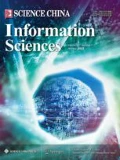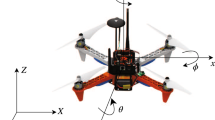Abstract
This paper investigates the distributed time-varying formation (TVF) problems for general linear multi-agent systems (MASs) subject to matched bounded uncertainties based on an adaptive event-triggered mechanism. A TVF protocol was designed with an event-triggered mechanism by introducing adaptive weights into the formation control protocol and triggering condition, and the large chattering phenomenon was avoided by the σ-modiflcation adaptive law. According to the Lyapunov stability theory, proof has been established that the MASs in the presence of uncertainties can realize the expected formation that satisfies the given feasible condition. Finally, an example is provided to verify the effectiveness of the proposed algorithm.
Similar content being viewed by others
References
Dong X W, Yu B C, Shi Z Y, et al. Time-varying formation control for unmanned aerial vehicles: theories and applications. IEEE Trans Contr Syst Technol, 2015, 23: 340–348
Li H, Xie P, Yan W. Receding horizon formation tracking control of constrained underactuated autonomous underwater vehicles. IEEE Trans Ind Electron, 2017, 64: 5004–5013
Wang C, Xie G M, Cao M. Forming circle formations of anonymous mobile agents with order preservation. IEEE Trans Automat Contr, 2013, 58: 3248–3254
Ren W. Consensus strategies for cooperative control of vehicle formations. IET Control Theor Appl, 2007, 1: 505–512
Lin Z Y, Wang L L, Han Z M, et al. A graph laplacian approach to coordinate-free formation stabilization for directed networks. IEEE Trans Automat Contr, 2016, 61: 1269–1280
Dong X W, Hu G Q. Time-varying formation control for general linear multi-agent systems with switching directed topologies. Automatica, 2016, 73: 47–55
Zhao S Y. Affine formation maneuver control of multiagent systems. IEEE Trans Automat Contr, 2018, 63: 4140–4155
Porfiri M, Roberson D G, Stilwell D J. Tracking and formation control of multiple autonomous agents: a two-level consensus approach. Automatica, 2007, 43: 1318–1328
Ma C Q, Zhang J F. On formability of linear continuous-time multi-agent systems. J Syst Sci Complex, 2012, 25: 13–29
Dong X W, Xi J X, Lu G, et al. Formation control for high-order linear time-invariant multiagent systems with time delays. IEEE Trans Control Netw Syst, 2014, 1: 232–240
Dong X W, Shi Z Y, Lu G, et al. Time-varying output formation control for high-order linear time-invariant swarm systems. Inf Sci, 2015, 298: 36–52
Dong X W, Hu G Q. Time-varying output formation for linear multiagent systems via dynamic output feedback control. IEEE Trans Control Netw Syst, 2017, 4: 236–245
Wang R, Dong X W, Li Q D, et al. Distributed adaptive time-varying formation for multi-agent systems with general highorder linear time-invariant dynamics. J Franklin Inst, 2016, 353: 2290–2304
Wang C Y, Zuo Z Y, Gong Q H, et al. Formation control with disturbance rejection for a class of Lipschitz nonlinear systems. Sci China Inf Sci, 2017, 60: 070202
Zhu W, Zhou Q H, Wang D D, et al. Fully distributed consensus of second-order multi-agent systems using adaptive event-based control. Sci China Inf Sci, 2018, 61: 129201
Chen J, Gan M G, Huang J, et al. Formation control of multiple Euler-Lagrange systems via null-space-based behavioral control. Sci China Inf Sci, 2016, 59: 010202
Wen G X, Chen C L P, Dou H, et al. Formation control with obstacle avoidance of second-order multi-agent systems under directed communication topology. Sci China Inf Sci, 2019, 62: 192205
Tang T, Liu Z X, Chen Z Q. Event-triggered formation control of multi-agent systems. In: Proceedings of the 30th Chinese Control Conference, 2011. 4783–4786
Ge X, Han Q. Distributed formation control of networked multi-agent systems using a dynamic event-triggered communication mechanism. IEEE Trans Ind Electron, 2017, 64: 8118–8127
Li X D, Dong X, Li Q D, et al. Event-triggered time-varying formation control for general linear multi-agent systems. J Franklin Inst, 2019, 356: 10179–10195
Zhu W, Cao W, Jiang Z P. Distributed event-triggered formation control of multiagent systems via complex-valued Laplacian. IEEE Trans Cybern, 2019. doi: https://doi.org/10.1109/TCYB.2019.2908190
Wang J H, Xu Y L, Xu Y, et al. Time-varying formation for high-order multi-agent systems with external disturbances by event-triggered integral sliding mode control. Appl Math Comput, 2019, 359: 333–343
Wang J H, Zhang X, Xu Y, et al. Distributed adaptive formation control for non-identical non-linear multi-agents systems based on sliding mode. IET Control Theory Appl, 2019, 13: 222–229
Liu T F, Jiang Z P. Distributed formation control of nonholonomic mobile robots without global position measurements. Automatica, 2013, 49: 592–600
Wang P, Ding B C. Distributed RHC for tracking and formation of nonholonomic multi-vehicle systems. IEEE Trans Automat Contr, 2014, 59: 1439–1453
Yoo S J, Kim T H. Predesignated fault-tolerant formation tracking quality for networked uncertain nonholonomic mobile robots in the presence of multiple faults. Automatica, 2017, 77: 380–387
Godsil C D, Royle G. Algebraic Graph Theory. New York: Springer, 2001
Acknowledgements
This work was supported by Science and Technology Innovation 2030—Key Project of “New Generation Artificial Intelligence” (Grant No. 2018AAA0102303), National Natural Science Foundation of China (Grant Nos. 61922008, 61973013, 61873011, 61803014), Innovation Zone Project (Grant No. 18-163-00-TS-001-001-34), Beijing Natural Science Foundation (Grant No. 4182035), Young Elite Scientists Sponsorship Program by CAST (Grant No. 2017QNRC001), Aeronautical Science Foundation of China (Grant No. 20170151001), Special Research Project of Chinese Civil Aircraft, State Key Laboratory of Intelligent Control and Decision of Complex Systems, Key Laboratory of System Control and Information Processing, and Defense Industrial Technology Development Program.
Author information
Authors and Affiliations
Corresponding author
Rights and permissions
About this article
Cite this article
Li, X., Bai, Y., Dong, X. et al. Distributed time-varying formation control with uncertainties based on an event-triggered mechanism. Sci. China Inf. Sci. 64, 132204 (2021). https://doi.org/10.1007/s11432-019-2770-8
Received:
Revised:
Accepted:
Published:
DOI: https://doi.org/10.1007/s11432-019-2770-8




